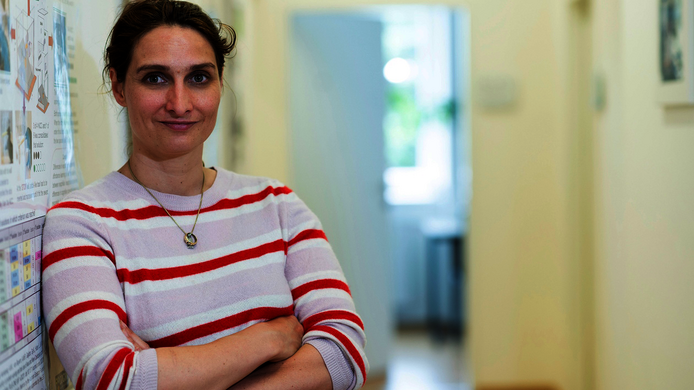Why does the Goffin's cockatoo use a hook?

FWF: What is the START project about? Alice Auersperg: It addresses the question of how tool use begins. Humans and other higher primates manufacture and use tools for specific tasks. In order to better understand our own technical evolution, we are investigating the reasons for tool use on a very distantly related species that has similar capabilities. In this way we can assume that this ability developed independently. More than 300 million years of evolution separate us from the Indonesian Goffin’s cockatoo – our last common ancestor lived long before the dinosaurs. We know that the Indonesian Goffin's cockatoo can craft and use specific tools on a level similar to higher primates. It can make a tool for a given task, such as a hook, out of various materials like twigs, cardboard or wire. FWF: What answers would you like the project to provide? Auersperg: We want to find out what triggers this behaviour and what type of cognitive basis is required. There are several theories on tool use and we base our work on all four levels of analysis according to Tinbergen. These are the questions we try to answer: what in the nature and environment of the Goffin’s cockatoo inspires it to invent tools? How does tool use develop as the bird grows up? Did this ability really start in this species or is it an older behavioural trait? We test this by giving comparable tasks to species closely related to the Goffin’s cockatoo. And the last question: how does tool use work, what mechanisms are involved? In order to find out, we investigate the cockatoo's perception and its cognitive abilities. We measure its visual field in relation to the length of the tool, for instance, and check to what extent the animal understands the physical and causal relationships it establishes between objects by means of the tool. We test their mental flexibility and their memory.
FWF: What are the first steps? Auersperg: We will start with field research on the Moluccan Islands, because we already have a prospective team for this purpose. We will expand the field laboratory and look at certain behaviour patterns in relation to the ecology of the Goffin's cockatoos. It is important to know, for example, what resources the birds need and whether these are available seasonally and predictably. When a nutritious morsel is embedded somewhere, the use of tools becomes relevant. The more opportunistic an animal is – or so runs the hypothesis – the more flexible is its brain and the better its problem-solving capacity. In an unpredictable environment it would be unwise to be a specialist stuck in routines. We are planning studies with close relatives of the Goffin’s cockatoo at the Loro Parque on Tenerife in cooperation with the Max Planck Institute. FWF: What does the START Award mean for your research activities? Auersperg: We knew that Goffin’s cockatoos use tools very confidently. But to understand what this means for the evolution of tool use, we need a large integrative study. That is the only way. In order to explain behaviour, we need to ask and answer questions on all four levels of analysis according to Nikolaas Tinbergen. This is something that is very rarely done, and the START Award now gives me the opportunity to do it. FWF: What motivates you in your daily research? How do you deal with setbacks? Auersperg: Every question we try to answer raises new questions. A negative answer is always the motivation to find a better question and a better answer. I am motivated by my keen interest and my students.
Alice Auersperg, a zoologist by training, founded the Goffin-Lab at the University of Vienna. She also worked with great apes at the Max Planck Institute in Leipzig. In the context of an Erwin Schrödinger Fellowship from the FWF, she did comparative research on the behaviour of ravens and parrots at Oxford University. Currently, Auersperg is the scientific head of the Goffin-Lab at the Messerli Research Institute, University of Veterinary Medicine Vienna.
About the project The START project "Innovative tool use and problem solving in a parrot", including field research in Indonesia and Spain, is designed to examine in great detail the environmental conditions and cognitive requirements for the use of tools by Goffin’s cockatoos. While only a very distant relative of higher primates such as humans and great apes, this parrot species fashions tools for specific tasks at a similarly high level.
START Prize The START programme of the Austrian Science Fund FWF is aimed at outstanding young researchers, giving them the opportunity to plan their research over an extended period and with a high degree of financial security. It is endowed with up to EUR 1.2 million and is one of Austria's most prestigious and most highly endowed awards alongside the Wittgenstein Award.





